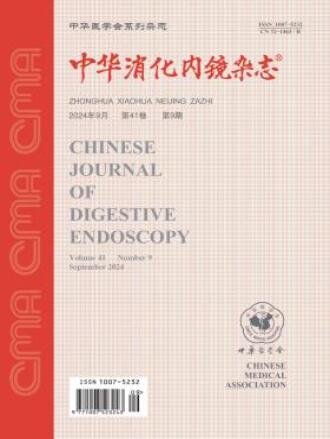Association of juxtapapillary duodenal diverticulum with pancreaticobiliary diseases and with diagnosis and treatment of endoscopy
引用次数: 0
Abstract
Objective To study the relationship between juxtapapillary duodenal diverticulum (JPDD) and pancreaticobiliary diseases, and the effect of JPDD on the diagnosis and treatment of ERCP. Methods A retrospective analysis was performed on data of 1 230 patients who had received ERCP in general surgery departments of Shengjing Hospital of China Medical University from January 2012 to January 2017. The patients were divided into JPDD group (n=360) and non-JPDD group (n=870) according to whether JPDD was found. Patients with JPDD were divided into intradiverticular papilla group (n=41) and non-intradiverticular papilla group (n=319) according to whether the papilla located in diverticulum. The incidence of pancreaticobiliary diseases, success rate of cannulation, success rate of stones removal, and incidence of postoperative complications among each group were compared by using chi-square test or Fisher′s exact probability. P<0.05 was statistically significant. Results The incidence of choledocholithiasis, primary choledocholithiasis and recurrent choledocholithiasis were 87.78% (316/360) , 31.11% (112/360) , and 6.67% (24/360) , respectively, in the JPDD group, and 75.52% (657/870) , 19.08% (166/870) , and 4.02% (35/870) , respectively, in the non-JPDD group. There were significant differences between the two groups (χ2=23.158, P 0.05) . The incidence of recurrent choledocholithiasis in the intradiverticular papilla group and the non-intradiverticular papilla group were 14.63% (6/41) and 5.64% (18/319) , respectively, with significant difference (χ2=4.721, P=0.030) . There were no significant differences between the two groups in the incidence of choledocholithiasis and primary choledocholithiasis, the success rate of cannulation and complete stones removal during the first ERCP session, as well as the incidence of postoperative hemorrhage, pancreatitis and hyperamylasemia (all P>0.05) . Conclusion JPDD is associated with the occurrence of primary choledocholithiasis. JPDD patients, especially the patients with intradiverticular papilla, are more likely to have recurrent choledocholithiasis after ERCP treatment. Key words: Cholangiopancreatography, endoscopic retrograde; Juxtapapillary duodenal diverticulum; Intradiverticular papilla十二指肠乳头旁憩室与胰胆管疾病及内镜诊治的关系
目的探讨十二指肠乳头旁憩室(JPDD)与胰胆管疾病的关系及对ERCP诊断和治疗的影响。方法对2012年1月至2017年1月在中国医科大学盛京医院普通外科接受ERCP的1230例患者的资料进行回顾性分析。根据是否发现JPDD,将患者分为JPDD组(n=360)和非JPDD组,n=870。根据乳头是否位于憩室内,将JPDD患者分为乳头内组(n=41)和乳头外组(n=319)。采用卡方检验或Fisher精确概率比较各组胰胆管疾病的发生率、插管成功率、取石成功率和术后并发症的发生率。结论JPDD与原发性胆总管结石的发生有关。JPDD患者,尤其是有乳头状乳头的患者,在ERCP治疗后更有可能出现复发性胆总管结石。关键词:胰胆管造影,内镜逆行;十二指肠乳头旁憩室;憩室内乳头
本文章由计算机程序翻译,如有差异,请以英文原文为准。
求助全文
约1分钟内获得全文
求助全文
来源期刊
CiteScore
0.10
自引率
0.00%
发文量
7555
期刊介绍:
Chinese Journal of Digestive Endoscopy is a high-level medical academic journal specializing in digestive endoscopy, which was renamed Chinese Journal of Digestive Endoscopy in August 1996 from Endoscopy.
Chinese Journal of Digestive Endoscopy mainly reports the leading scientific research results of esophagoscopy, gastroscopy, duodenoscopy, choledochoscopy, laparoscopy, colorectoscopy, small enteroscopy, sigmoidoscopy, etc. and the progress of their equipments and technologies at home and abroad, as well as the clinical diagnosis and treatment experience.
The main columns are: treatises, abstracts of treatises, clinical reports, technical exchanges, special case reports and endoscopic complications.
The target readers are digestive system diseases and digestive endoscopy workers who are engaged in medical treatment, teaching and scientific research.
Chinese Journal of Digestive Endoscopy has been indexed by ISTIC, PKU, CSAD, WPRIM.

 求助内容:
求助内容: 应助结果提醒方式:
应助结果提醒方式:


